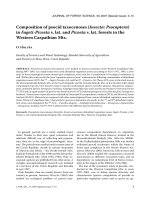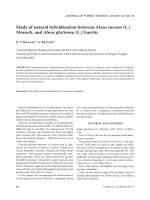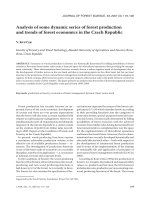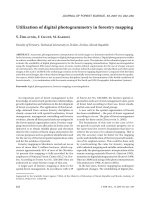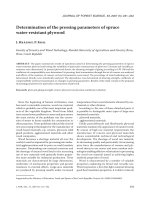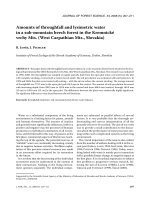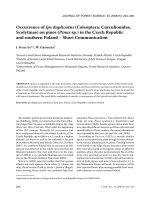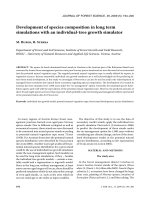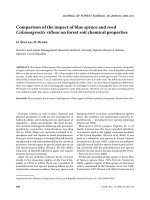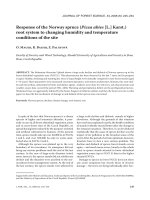Báo cáo lâm nghiệp: "development of winter hardiness of pine and spruce seedlings in a simulated acid rain experimen" potx
Bạn đang xem bản rút gọn của tài liệu. Xem và tải ngay bản đầy đủ của tài liệu tại đây (769.85 KB, 3 trang )
The
development
of
winter
hardiness
of
pine
and
spruce
seedlings
in
a
simulated
acid
rain
experiment
J.
Reinikainen
S. Huttunen
Department
of
Botany,
University
of
Oulu,
SF-90570
Oulu,
Finland
Introduction
The
effects
of
acidified
rainwater
on
the
hardiness
level
perceivable
in
the
ultra-
structure
of
needles
of
conifer
seedlings
were
examined
during
autumn
and
winter
1986-87.
Materials
and
Methods
One
and
2
yr
old
Scots
pine
(Pinus
sylvestris)
and
Norway
spruce
(Picea
abies)
seedlings
from
several
provenances
had
been
irrigated
with
artificially
acidified
rain
(H
2
S0
4
:HN0
3,
2:1)
for
7
wk
during
the
hardening
time
in
the
pre-
vious
autumn.
In
the
experiment
performed
at
the
University
of
Oulu,
the
seedlings
investigat-
ed
comprised
samples
treated
with
pH
3,
pH
4
and
clean
(pH
about
7)
water,
in
addition
to
a
dry
control,
with
samples
of
each
group
from
2
different
provenances.
The
development
of
the
hardiness
level
was
followed
by
making
light
and
electron
microscope
observations
of
the
mesophyll
tissue
of
the
current
year’s
needles.
Sampling
was
done
about
once
a
month
from
August
until
April.
The
0.5
mm
thick
needle
cut-
tings
were
fixed
with
glutaraldehyde
and
OS04
in
0.05
or
0.1
M
phosphate
buffer
and,
after
fixation,
the
needle
sections
were
dehydrated
in
an
alcohol
series
and
embedded
in
Ladd’s
epon.
Results
The
hardening
of
the
seedlings
had
alrea-
dy
begun
in
mid-August,
with
decreasing
numbers
of
starch
grains
and
chloroplasts
moving
towards
cell
corners
(Fig.
1
The
needles
of
the
northernmost
provenances
of
spruce
seedlings
lost
their
starch
grains
earlier
than
the
southernmost
seedlings,
whereas
in
pine
seedlings
no
great
differ-
ences
could
be
seen
in
this
respect.
In
September,
the
cytoplasm
became
net-
like
upon
the
increase
of
the
endoplasmic
reticulum
(Fig.
2).
During
August-October,
many
small
vacuoles
containing
granular
material
developed
in
the
cytoplasm.
Myelin-like
membranous
formations
in
the
cytoplasm
became
abundant
during
the
winter
period
(Fig.
3).
As
of
Septem-
ber,
small,
single-membrane
fragments
were
seen
in
the
membrane-free
areas
of
the
chloroplasts.
The
highest
incidence
of
these
was
noted
in
March-April,
when
also
large,
whorl-like
membranous
struc-
tures
were
seen
in
abundance
in
chloro-
plast
stromata.
Chloroplast
division
was
greatest
in
September-October,
but
throughout
the
winter
some
dividing
chlo-
roplasts
could
be
seen.
The
mesophyll
cells
started
to
revert
from
the
hardened
to
the
unhardened
state
in
March-April,
when
the
starch
grains
again
appeared
(Fig.
4).
The
exposure
to
acid
rain
did
not
significantly
affect
the
ultrastructure
of
the
needles
during
the
first
winter.
Discussion
and
Conclusion
The
deleterious
effects
of
air
pollutants
on
the
cold
tolerance
of
conifers
have
been
reported
quite
recently
by
several
authors
(e.g.,
Davison
and
Barnes,
1986;
Freer-
Smith
and
Mansfield,
1987).
However,
the
effects
of
acid
rain
on
conifer
seedlings
could
not
be
seen
in
the
hardening
pro-
cess
after
2
months’
exposure.
Our
results
clarify
the
development
of
cold
hardiness
at
the
ultrastructural
level.
The
hardening
began
in
mid August
and
the
maximum
hardiness
level
was
reached
in
Decem-
ber-February.
The
changes
towards
springtime
started
in
March-April,
when
considerable
amounts
of
starch
were
seen
to
accumulate
in
chloroplasts.
The
devel-
opment
of
a
freezing
injury
in
the
acid
rain-treated
conifer
seedlings
is
discussed
in
Reinikainen
and
Huttunen
(1989).
Acknowledgments
This
work
was
supported
by
the
Finnish
Minis-
try
of
the
Environment.
Mrs.
T.
Siltakoski
is
gra-
tefully
acknowledged
for
her
valuable
technical
assistance.
References
Davison
A.W.
&
Barnes
J.D.
(1986)
Effects
of
winter
stress
on
pollutant
responses.
In:
How
are
the
Effects
of
Air
Pollutants
on
Agricultural
Crops
Influenced
by
the
Interaction
with
Other
Limiting
Factors.
COST-workshop
23-25/3/
1986.
Roskilde.
EEC,
National
Agency
of
Envi-
ronmental
Pollution,
Air
Pollution
Laboratory
Freer-Smith
P.H.
&
Mansfield
T.A.
(1987)
The
combined
effects
of
low
temperature
and
S0
2
+
N0
2
pollution
on
the
new
season’s
growth
and
water
relations
of
Picea
sitchensis.
New
Phy-
tol.
106,
237-250
Reinikainen
J.
&
Huttunen
S.
(1989)
The
level
of
injury
and
needle
ultrastructure
of
acid
rain-
irrigated
pine
and
spruce
seedlings
after
low
temperature
treatment.
New Phytol.
112,
29-39
